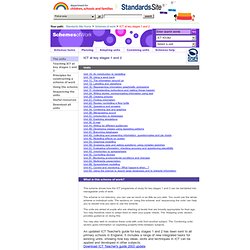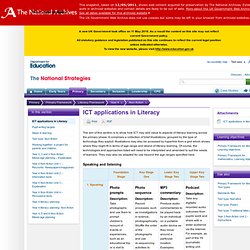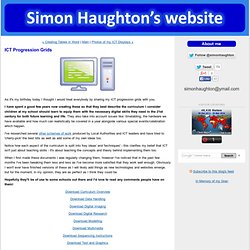

The Standards Site: ICT at key stages 1 and 2. This scheme shows how the ICT programme of study for key stages 1 and 2 can be translated into manageable units of work.

The scheme is not statutory; you can use as much or as little as you wish. You could use the whole scheme or individual units. The sections on ‘using this scheme’ and ‘sequencing the units’ can help you to decide how you want to use the scheme. The units are aimed at pupils who are attaining at levels that are broadly appropriate for their age. You may therefore need to adapt them to meet your pupils’ needs. You may also wish to combine these units with units from another subject. An updated ICT Teacher's guide for key stages 1 and 2 has been sent to all primary schools in England. ICT applications in Literacy. MP3 commentary Description: Produce audio commentaries to be played back by an individual on a portable audio device as they move around a particular location.

Examples: a guide to an art exhibition in which artists describe their pictures and sculptures; a guide to accompany a local history walk with descriptive and explanatory speech pertinent to specific points on the walk. Resources Digital sound recording devices or computers with microphones. Presentations Use pictures, text or multimedia effectively to support oral presentations. Interactive whiteboard. Reading without expression Use a talking word processor to illustrate how important expression is when reading aloud. Word processor with text-to-speech feature. Podcast Take any digitally recorded audio outcomes from pupils' work and share with a wider audience via the Internet. Audio files may be simply uploaded to a website so that they may be downloaded manually by listeners. Resources: Peer review. Kent Trust Web provided by Kent County Council. ICT Progression. This web site provides ideas and activities in how the use of ICT progresses through the Foundation Stages, supporting the whole curriculum.
Resources - the ICT resources are given in bold in each activity. If you wish for more information about these resources, many of them can be found on our reviews pages . Clicking on them will give you a direct link to the review page. These are underlined and are in blue. Although we have given specific examples of how these resources can be used, it is essential for children to have the opportunities to explore and experiment, and become familiar with the resources. While using any of the resources, it is essential for the practitioner to use correct vocabulary, such as mouse, keyboard, click, eject etc. The learning objectives can be found as Stepping Stones taken from the QCA curriculum for the Foundation Stage. The level of adult involvement depends on the ability of the child/children and the discretion of the practitioner. Site Pages - Progressions main page. ICT Progression Grids - Simon Haughton's Blog. As it's my birthday today I thought I would treat everybody by sharing my ICT progression grids with you.

I have spent a good few years now creating these so that they best describe the curriculum I consider children at my school should learn to equip them with the necessary digital skills they need in the 21st century for both future learning and life. They also take into account issues like: timetabling, the hardware we have available and how much can realistically be covered in a year alongside various special events/celebration which happen. I've researched several other schemes of work produced by Local Authorities and ICT leaders and have tried to 'cherry-pick' the best bits as well as add some of my own ideas too. Notice how each aspect of the curriculum is split into 'key ideas' and 'techniques' - this clarifies my belief that ICT isn't just about teaching skills - it's about teaching the concepts and theory behind implementing them too.
Download Curriculum Overview. Mr Lovegrove » Resources. February 2012 Primary ICT Teaching and Learning Framework The Primary ICT Teaching and Learning Framework is a scheme of work for the delivery of a consistent, creative and innovative ICT curriculum. The contributors and I wrote this Framework in 2011 as we wanted our students to have access to a modern curriculum which gave them useful and relevant ICT skills and started them on the journey of becoming digitally literate citizens. This Framework meets all of the UK National Curriculum requirements for the delivery of ICT for primary schools, but offers more in terms of creativity, collaboration and modern skill development. It’s also, crucially nowadays, designed to increase students’ awareness of e-safety and their responsibilities as modern technology users. Created by Matt Lovegrove with contributions from Steve Greenfield, John McLear, David Sheppard and Claire Waite.
Reception skills list provided by Emma Chamberlain.